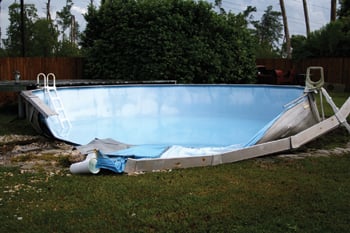 After weeks of record-breaking temperatures and oppressive humidity, much of the country is looking to cool off. Swimming pools are perfect for beating the heat, but they can also present some insurance complications.
After weeks of record-breaking temperatures and oppressive humidity, much of the country is looking to cool off. Swimming pools are perfect for beating the heat, but they can also present some insurance complications.
Such was the case for an FC&S subscriber's client, who was insured by a homeowners' policy form HO-3. The client's above-ground swimming pool collapsed because of deterioration. Water escaped and seeped into the basement of the residence through the walls and back door, causing damage to the building.
Q. Does the water-damage exclusion on the HO-3 void coverage for this type of loss?
A. Under previous iterations of the HO-3, an argument could be made for coverage for damage to the building from this cause. The water-damage exclusion on older versions of the form voided coverage for damage from natural occurrences of water, such as floods, surface water and backed-up sewers.
Recommended For You
Want to continue reading?
Become a Free PropertyCasualty360 Digital Reader
Your access to unlimited PropertyCasualty360 content isn’t changing.
Once you are an ALM digital member, you’ll receive:
- Breaking insurance news and analysis, on-site and via our newsletters and custom alerts
- Weekly Insurance Speak podcast featuring exclusive interviews with industry leaders
- Educational webcasts, white papers, and ebooks from industry thought leaders
- Critical converage of the employee benefits and financial advisory markets on our other ALM sites, BenefitsPRO and ThinkAdvisor
Already have an account? Sign In Now
© 2025 ALM Global, LLC, All Rights Reserved. Request academic re-use from www.copyright.com. All other uses, submit a request to [email protected]. For more information visit Asset & Logo Licensing.








